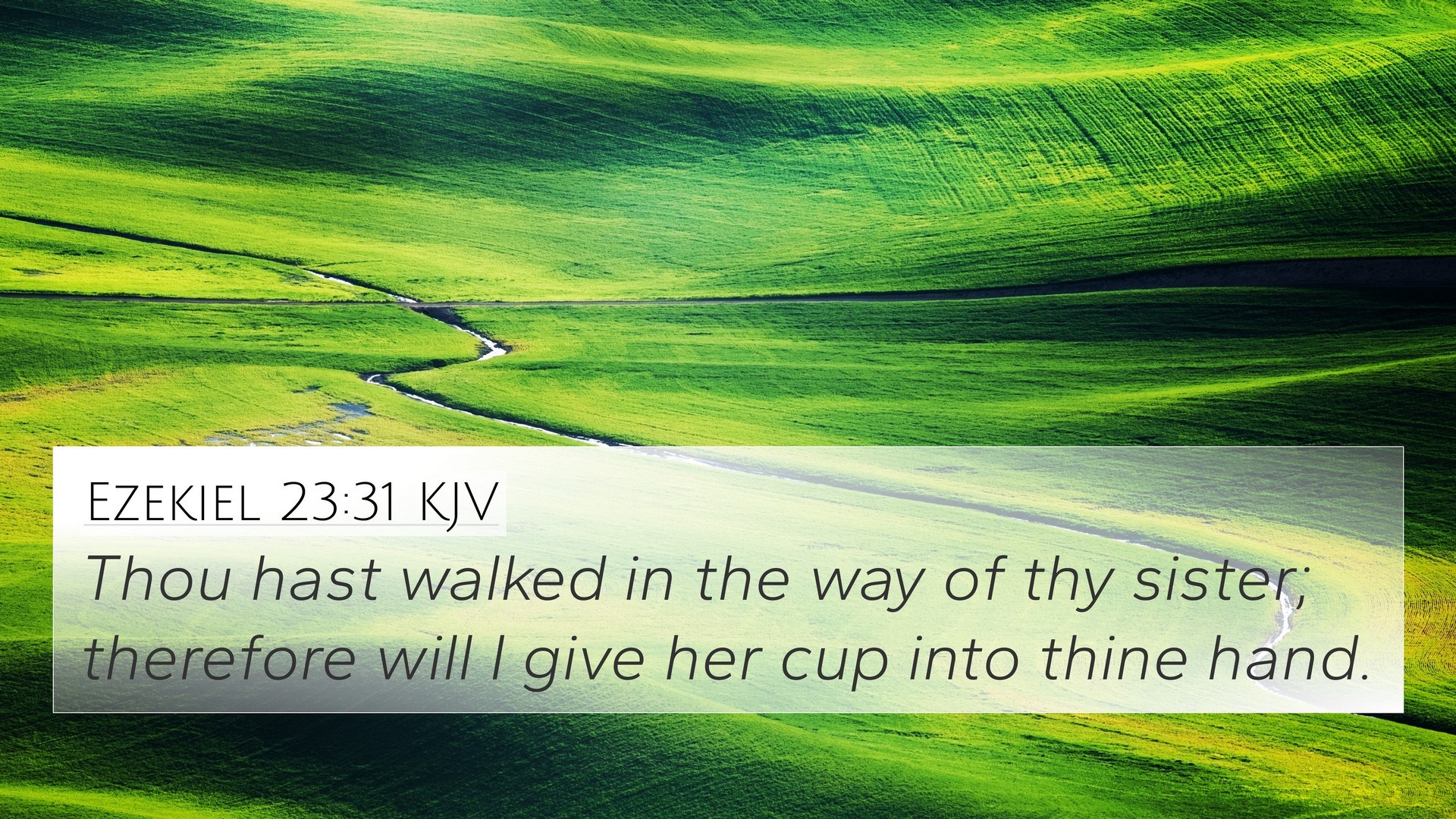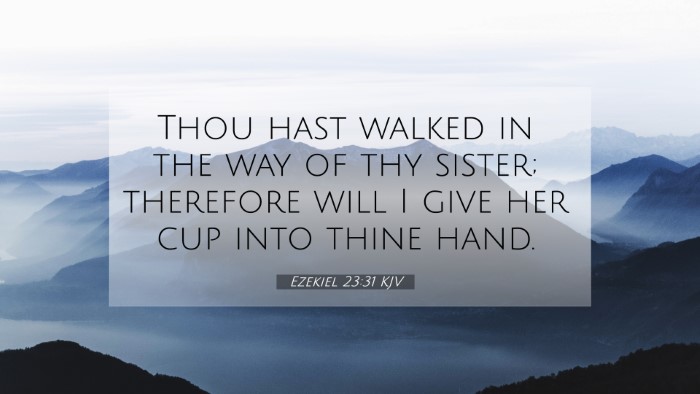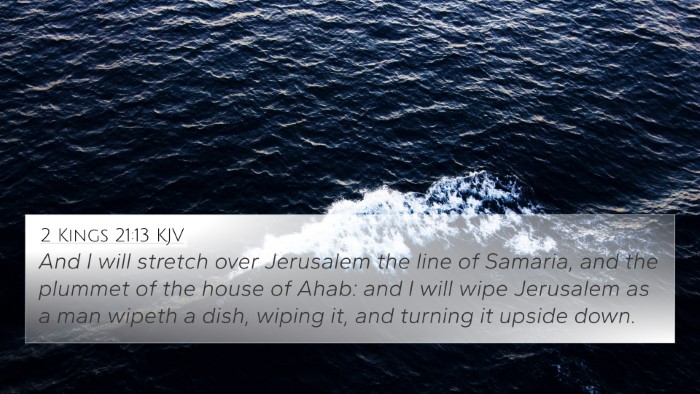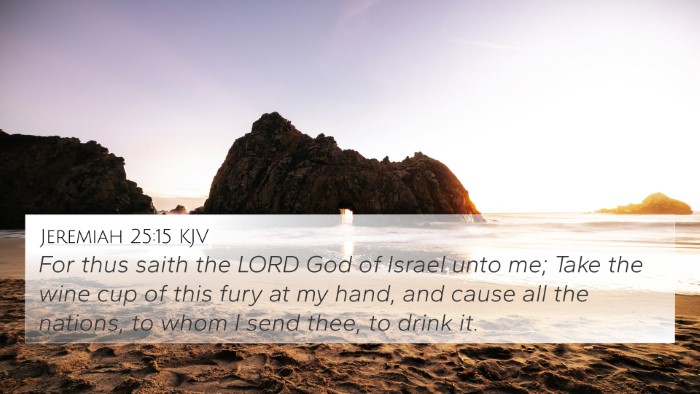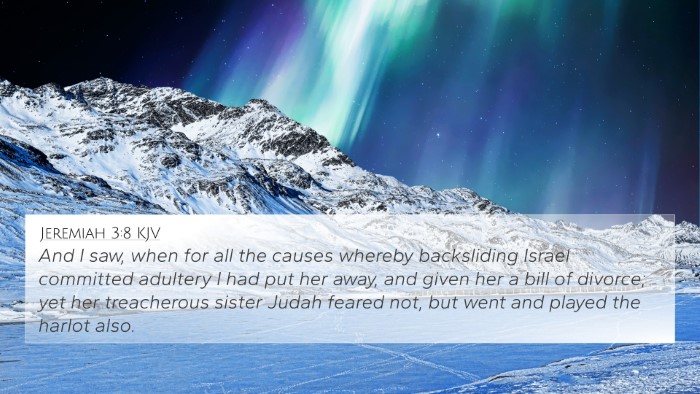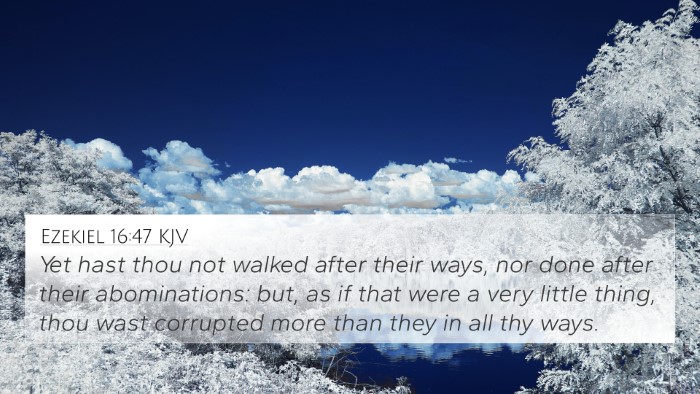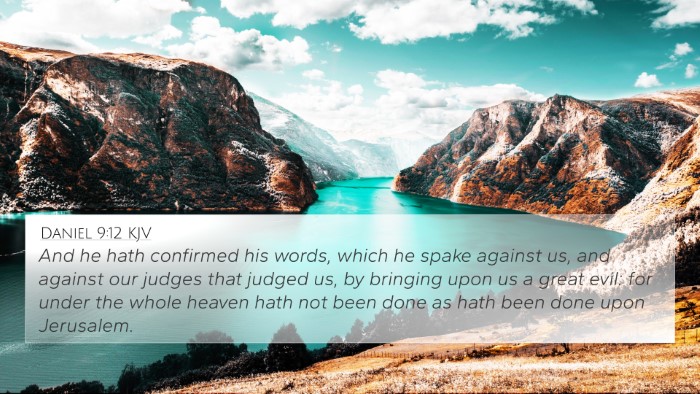Ezekiel 23:31 - Commentary and Interpretation
Bible Verse: Ezekiel 23:31 (KJV) - "Thou hast walked in the way of thy sister; therefore will I give her cup into thine hand."
This verse is part of a larger prophetic allegory where God, through the prophet Ezekiel, addresses the unfaithfulness of Israel, likening it to two sisters, Oholah and Oholibah, who represent Samaria and Jerusalem, respectively. The imagery of a "cup" signifies the impending judgment and destruction due to their actions.
Understanding the Cup
The "cup" mentioned symbolizes divine judgment. Throughout Scripture, a cup often represents a portion of fate, which can be either blessing or curse. In this context, it denotes the consequences of apostasy and rebellion against God.
Commentary Insights
- Matthew Henry: He reflects on the faithlessness of Israel, highlighting that their accepting the ways of their sister signifies a deeper moral and spiritual decay. He notes that walking "in the way of thy sister" is an admission of guilt.
- Albert Barnes: Barnes emphasizes that this verse's implication is the certainty of judgment. The act of giving the cup indicates that God will hold Israel accountable for its actions, having chosen to imitate its sister in sin.
- Adam Clarke: Clarke draws attention to the historical context, explaining how the consequences that befell Israel serve as a warning. He adds that the "cup" conveys a sense of inevitability in receiving punishment for one's choices.
Cross-References and Thematic Connections
In studying Ezekiel 23:31, we can draw parallels and connections to other Scriptures that deal with similar themes of judgment and accountability:
- Jeremiah 25:15: "For thus saith the LORD God of Israel unto me; Take the wine cup of this fury at my hand, and cause all the nations, to whom I send thee, to drink it." - This echoes the motif of divine judgment through the metaphor of a cup.
- Revelation 14:10: "The same shall drink of the wine of the wrath of God, which is poured out without mixture into the cup of his indignation..." - This emphasizes the inevitable occurrence of God's wrath as a direct consequence of unfaithfulness.
- Psalms 75:8: "For in the hand of the LORD there is a cup, and the wine is red; it is full of mixture; and he poureth out of the same: but the dregs thereof, all the wicked of the earth shall wring them out, and drink them." - Indicates that the cup serves as a pictorial representation of God's judgment on the wicked.
- Lamentations 4:21: "Rejoice and be glad, O daughter of Edom, that dwellest in the land of Uz; the cup also shall pass through unto thee: thou shalt be drunken, and shalt make thyself naked." - The concept of a cup as both a blessing and a curse is reiterated here.
- Matthew 20:22: "But Jesus answered and said, Ye know not what ye ask. Are ye able to drink of the cup that I shall drink of..." - This serves as a New Testament reflection on the burdens and sufferings faced by faithful followers of God.
- Isaiah 51:17: "Awake, awake, stand up, O Jerusalem, which hast drunk at the hand of the LORD the cup of his fury..." - A direct correlation with the judgment theme and its personification through the cup metaphor.
- 1 Corinthians 11:25: "After the same manner also he took the cup, when he had supped, saying, This cup is the new testament in my blood: this do ye, as oft as ye drink it, in remembrance of me." - While contrasting in meaning, this shows the duality of the cup’s significance in both judgment and communion.
- Mark 14:36: "And he said, Abba, Father, all things are possible unto thee; take away this cup from me: nevertheless not what I will, but what thou wilt." - Represents Christ's anticipation of the suffering to be borne, tied to the concept of divine purpose and sacrifice.
- Romans 2:6: "Who will render to every man according to his deeds." - Reinforces the principle that actions have consequences and highlights God’s righteousness in judgment.
- Galatians 6:7: "Be not deceived; God is not mocked: for whatsoever a man soweth, that shall he also reap." - An apt reminder that what one chooses to do, particularly in matters relating to faithfulness, will ultimately bear fruit, whether judgment or blessing.
Conclusion
Understanding Ezekiel 23:31 requires examining the broader context of judgment, accountability, and the metaphor of the cup. By cross-referencing this verse with other biblical texts, we uncover deeper connections and themes that illustrate the gravity of turning away from God. This inter-Biblical dialogue encourages believers to reflect on their paths and the ramifications of their choices.
Tools for Further Study
For those interested in deepening their study of cross-referenced themes in the Bible, utilizing a bible concordance or a bible cross-reference guide may prove beneficial. Such tools can aid in identifying connections between Old and New Testament teachings, exploring thematic Bible verse connections, and conducting a comparative Bible verse analysis. Engaging in cross-reference Bible study methods allows one to connect various scriptures, yielding greater insight into the depth and richness of God's Word.
